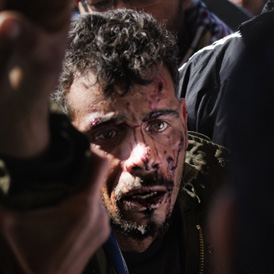Misrata faces humanitarian disaster
The long-besieged city of Misrata, the third largest in Libya, is facing imminent humanitarian disaster, writes Mike Hobbs a journalist who’s worked extensively in Libya.

Unless the Coalition forces make determined efforts to relieve the town’s civilians from the onslaught by the pro-Gaddafi troops, it is claimed that thousands will perish.
“There is now a severe shortage of medicine and food here,” reports a source who has been in the city since the revolution began.
“Much of the city is in ruins. The hospital has been destroyed by the Gaddafi army as well and, as you know, they have cut off both the water and electricity.”
Casualties are mounting. In the week from March 19-26, since the announcement of the supposed ceasefire, at least 105 civilians have been killed and 1300 injured (many of them women, children and the aged) as a direct result of the shelling from pro-Gaddafi forces.
These numbers do not include those bodies killed by sniper fire that are scattered along the length of Tripoli Street – the continued presence of pro-Gaddafi snipers makes it impossible to claim them for burial, or even count them. “There are so many,” says the source. “I cannot say how many.”

Libya war: click on the image to view an interactive video timeline map.
The battle for control of Misrata has been raging virtually since the revolution began on February 18, over five weeks ago.
Fierce fighting in the streets has been eddying to and fro for several days. The pro-Gaddafi forces now completely surround the city, including from the seaward side.
Down at the port, there are around 3,000 Egyptians and a further 2,000 Africans waiting to get away. “They are placed in the street on the front of the port. The Red Crescent cannot reach them so we try to share our food with them.”
But that food is running out. “Our main needs are to establish some sort of hospital at the port, get some medicine – and, of course, find more food and water,” says the source.
“Please call for all human rights organisations to do anything they can for us.”
Mike Hobbs is a freelance journalist who has worked extensively in Libya.